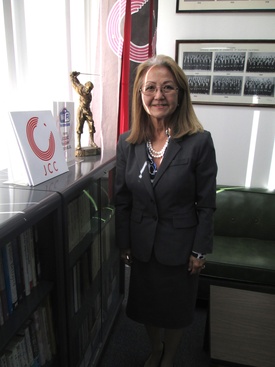Transfer to a school in a poor area was a turning point in my career as a teacher
Kitty Sanki is a third-generation Japanese American. She was awarded the Order of the Rising Sun, Gold and Silver Rays in the fall of 2017. Kitty and I have a mutual acquaintance. I had often heard rumors about her, but I wanted to take this opportunity to ask her why she is so dedicated to community activities and what her thoughts are on the coexistence of Japanese Americans and Shin-Issei like me. We met one day in December at the Japanese Chamber of Commerce of Southern California in Little Tokyo.
Kitty was born in Tokyo as the eldest daughter of George Sanki, who served as the linguistics assistant to the US High Commissioner in Okinawa during the time Okinawa was under American rule. She spent her elementary and high school years at a US military base in Okinawa, and then went on to study at the University of California, Los Angeles. After graduating, she chose to become a teacher. Her turning point came in the 1980s, when she moved from a school in the San Fernando Valley, where the majority of students were white, to an elementary school in the poor South Central district. "The children were living in very miserable conditions. They were hungry when they came to school in the morning. Some children only had potato chips for breakfast. It was an extremely poor environment for children to grow up in. I still can't forget the shock I felt at the beginning." After teaching at that elementary school for five years, Kitty began to explore what she could do for them other than as a teacher. Through the organization she belonged to, she planned and implemented a fundraiser to raise scholarships for poor children so that they could go to college in the future.
Her mentor is her grandfather, lawyer Gongoro Nakamura
"Even if I had a full-time job, I was able to work in the community," says Kitty. However, while it's easier said than done, there are many organizations she has been involved in. She began her campaign to seek an apology from the U.S. government for the forced internment of Japanese Americans during World War II, and has been involved with the Japanese American Citizens League Downtown Los Angeles Chapter, the Japanese Optimist Club, the Japanese Chamber of Commerce of Southern California, where she served as president until 2016, and the Japanese Women's Association of Southern California. When asked what motivates her, she answered, "I'm always thinking about what I can bring to the new generation." She is a born educator. Who is Kitty's mentor? In response to that question, the name of the person she had imagined was mentioned. It was Nakamura Gongoro, a human rights lawyer. Originally from Okinawa Prefecture, he traveled to Los Angeles via Hawaii, opened a law firm in the 1920s, and worked hard for Japanese immigrants. The lawyer was Kitty's maternal grandfather.
"My grandfather passed away in 1965. After graduating from high school in Okinawa, I returned to Los Angeles to enroll at UCLA. That was in July of 1965. My grandfather passed away in September. During that short time, I tried to spend time with him, wanting to hear as much about his experiences as possible." However, it must have been impossible to hear everything about my grandfather's turbulent life, in those two months, after he was sent to an internment camp and served as a leader for Japanese Americans. "The truth is, my mother never told me about the internment camps during the war. I later found out that she was too angry (at the unfair treatment) to talk about it."
Surprised by the award , "I just acted as a go-between"
After retiring from teaching in 2009, Kitty became more active in the community and has had contact with many Americans and Japanese people. I asked her a simple question I had always wanted to ask. "It seems like there is a gap between the Shin-Issei born in Japan and Japanese Americans. There are differences in language, culture, and past experiences. But as people with the same roots, what can we do to get along better?" Kitty immediately replied, "The key is dialogue." "It's fine to start with a small number of people. Then you can increase the number to six or eight. First, get to know the other person. Misunderstandings occur because you don't know the other person. It's important to know that you are different from each other. Then share your ideas. They don't have to be correct, and they don't have to be the only ideas."
Although she seems to devote much of her time to community activities, when asked what her hobbies are she answers "reading," followed by "baking." Furthermore, to stay healthy, she makes sure to walk 20,000 steps every day. "My house is close to a freeway junction, so it's very convenient. I can easily drive to meet all kinds of people."
Finally, when I congratulated her again on receiving the decoration from the Japanese government, she said, "To be honest, I didn't expect it at all." "I was very surprised and felt honored. I was happy that my family and the community congratulated me. But I was only able to receive this decoration because of the contributions of many people behind me. I was just a bridge between them." When I couldn't help but comment, "Kitty, that's a very humble attitude," she immediately replied, "No, that's the truth," with a smile, as if a teacher was pointing something out to a student.
© 2018 Keiko Fukuda






